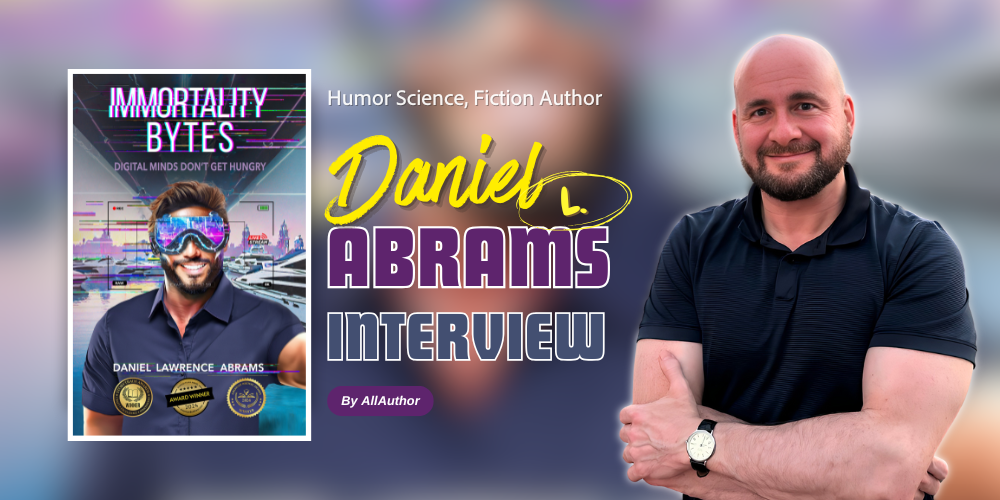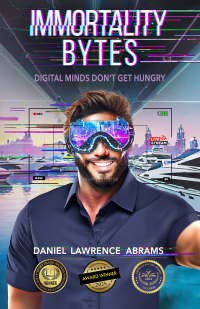Daniel L Abrams Interview Published on: 09, Apr 2025
 What inspired you to invent a 3-D input device, and how did you go from concept to earning a U.S. patent?’
What inspired you to invent a 3-D input device, and how did you go from concept to earning a U.S. patent?’
I’m “cursed” with never-ending epiphanies (not all of which are good or original) that I often fall in love with. I see a better future that I optimistically, perhaps delusionally, think is possible. So, I try to at least craft the idea (writing stories or designing inventions). My 3-D input device sprang from my incredulity that we use 2-D input devices (mouse, trackpad) to work in a 3-dimensional space. So I brainstormed 8 designs, did a “prior art search” (found out 5 were already invented), and then tried to draft the patent claims for my favorite design as if I were going to file pro se. Fortunately, a patent attorney cut me a break and re-drafted the application that was approved.
How has your experience as an inventor influenced your creative writing and storytelling?I’m able to “red-team” ideas for inventions and novels (using criticism and a form of “falsifiability” as methods for testing the viability of an idea); if the idea survives that process, I take the next step in developing it.
You trained at The Second City and The Groundlings—how did those experiences shape your comedic voice?Definitely. They teach the improv comedy technique called “Yes and” where you take an idea (however crappy or great it might be) and add to it elements that affirm its existence. After this, you can hunt for plot holes. This process helps make the story more “consequential” (scenes causing subsequent ideas) instead of simply “sequential” (scenes merely happening afterward).
What was it like performing stand-up at legendary venues like the Comedy Cellar and The Improv? Any memorable moments?I would “kill” (have the audience laughing huge throughout and even creating “applause breaks”) around 20% of the time. I’d do “fine” about 50% of the time; unfortunately, I’d completely suck and humiliate myself around 30% of the time (which is soul-crushing). I had trouble improving on that ratio and gave up before breaking through to the next level.
Do you have a preference between writing comedy and performing it, or do you enjoy both equally?I haven’t performed stand-up in many, many years. But I do like putting on shows I wrote for an audience (to hear their laughs and enjoyment).
Your plays have been staged at prestigious venues like The Stella Adler Theatre. What draws you to playwriting compared to TV and film?It’s super hard and crazy rare to make money playwriting. My plays were de facto presentations to studio and network execs for them to potentially turn into tv series.
How does writing for the stage differ from writing a novel, and which do you find more challenging?Writing for the stage and screen is very different from authoring novels. Scripts demand efficiency and reliance on the rest of the crew to expound upon your story with their department’s vision as a collaboration (actors’ performances, cinematography, production/set design, costumes, hair & make-up, etc.). When I first drafted my novel, it suffered from “white room syndrome.” It took a lot of learning, crafting, and merciless rewriting & editing to make it a proper novel. The 19 accolades IMMORTALITY BYTES has earned (including five 1st-place wins) are a testament to the importance of editing and rewriting.
You’ve written, produced, and directed over 100 hours of TV—what’s been your most rewarding project, and why?The breast cancer documentary I co-produced (“Pink & Blue: Colors of Hereditary Cancer”) has probably done the most good. But the play/pilot presentation I wrote and directed (performed at the old HBO/Warner Brothers Television Workspace) was the most exciting. It co-starred Jenna Fischer (before she was cast in THE OFFICE).
What’s the biggest lesson you’ve learned from working in the writing industry so far?You’ve gotta love writing and be comfortable enduring rejection. Otherwise, it’s many orders of magnitude of terrible odds of getting rich from your novels. If you write a great book that’s marketable, you can make some money, but that ROI can’t be your motivation.
Your films and screenplays have won numerous accolades—what’s your approach to crafting an award-winning script?You gotta have a big hook that’s unique. Your first page has to have a surprise/twist or a punch-you-in-the-face funny line/moment because most Hollywood types have worse ADHD and are more capricious than anyone in the book world. You also have to ensure your script is “castable,” — which means at least a supporting role for a male star in their 20s-50s. I have no insight into the teen & kids films (which are their own worlds). A cast of characters exclusively in their 60s+ requires relationships with mega-stars of that age. Otherwise, your demographic is too small and rarely goes to the movies or buys downloads.
Your TEDx Talk, “Sports Can Save Politics,” presents an intriguing idea. Can you elaborate on how sports can bridge political divides?I propose a system where users can specify their priorities regarding policies and objectives (e.g., lower unemployment or gas prices, higher GDP or the stock market, reduce the deficit, more/less military actions, for/against abortion or immigration, etc.). After which, the system analyzes the federal & state administrations’ performance going back 20/40/60 years and returns the results. Users can see who actually delivers on the user’s objectives. I claim that if more people knew the actual results, they’d vote to achieve their objectives better and get even better results with new leadership. For example, most people don’t know that federal deficits have historically gone up more (gotten worse) under Republican rule compared to Democratic rule (which is the only party to shrink deficits). You can prioritize whatever you want, and that’d result in different parties being proven more effective on polarizing issues. Basically, create a system to demonstrate what voters actually get with different political parties.
What was the biggest takeaway you wanted audiences to get from your book, “IMMORTALITY BYTES?I want them to be entertained and astounded by the twists, laugh at the humor, and have their mind opened to nerdy/trippy ideas. One of the rarer ones cautions that using only brain scans to potentially make immortal digital minds ignores how much our hormones/endorphins/body chemistry affects our thinking (consider those who get “hangry” vs. those who finally start working out regularly feel better). I say these are 86% serious questions: Do computerized brains enjoy pizza? And if not, why live forever?”
You wrote a column for Mensa Magazine—what kinds of topics did you explore, and do you still contribute?I proposed using gambling theories to improve the legal system. I hated (and still hate) it when companies decide to rip off or endanger their customers and others just because it’s a good business model. If a shady company thinks there’s only a 1/10 chance they get caught hurting people and a product recall costs millions, they could detestably rationalize not telling the public and risk the consequences as a ”profitable play.” I proposed making certain penalties exceed any risk/reward ratio the shadier execs could want. Make it “bad business” to hurt people.
What’s next for you—any upcoming projects in film, TV, or writing that you’re excited about?I’m developing feature films and TV series (pitching to streaming services and film financiers) and starting to write my second novel (another sci-fi/comedy/thriller).
How were you introduced to AllAuthor, and would you say that this website has been helpful?The AllAuthor folks are friendly and conscientious. I’m eager to prosper together.
Daniel Lawrence Abrams is an inventor, comedian, playwright, and filmmaker. Abrams has performed stand-up at renowned venues like NYC’s Comedy Cellar and LA’s The Improv, while his plays have graced stages such as The Stella Adler Theatre and Powerhouse Theater. With over a hundred hours of TV content to his name, Abrams has earned accolades for his films and screenplays in numerous film festivals. A TEDx speaker on "Sports Can Save Politics," Abrams also wrote a column for Mensa magazine, which hasn’t yet expelled him.


